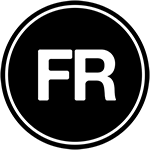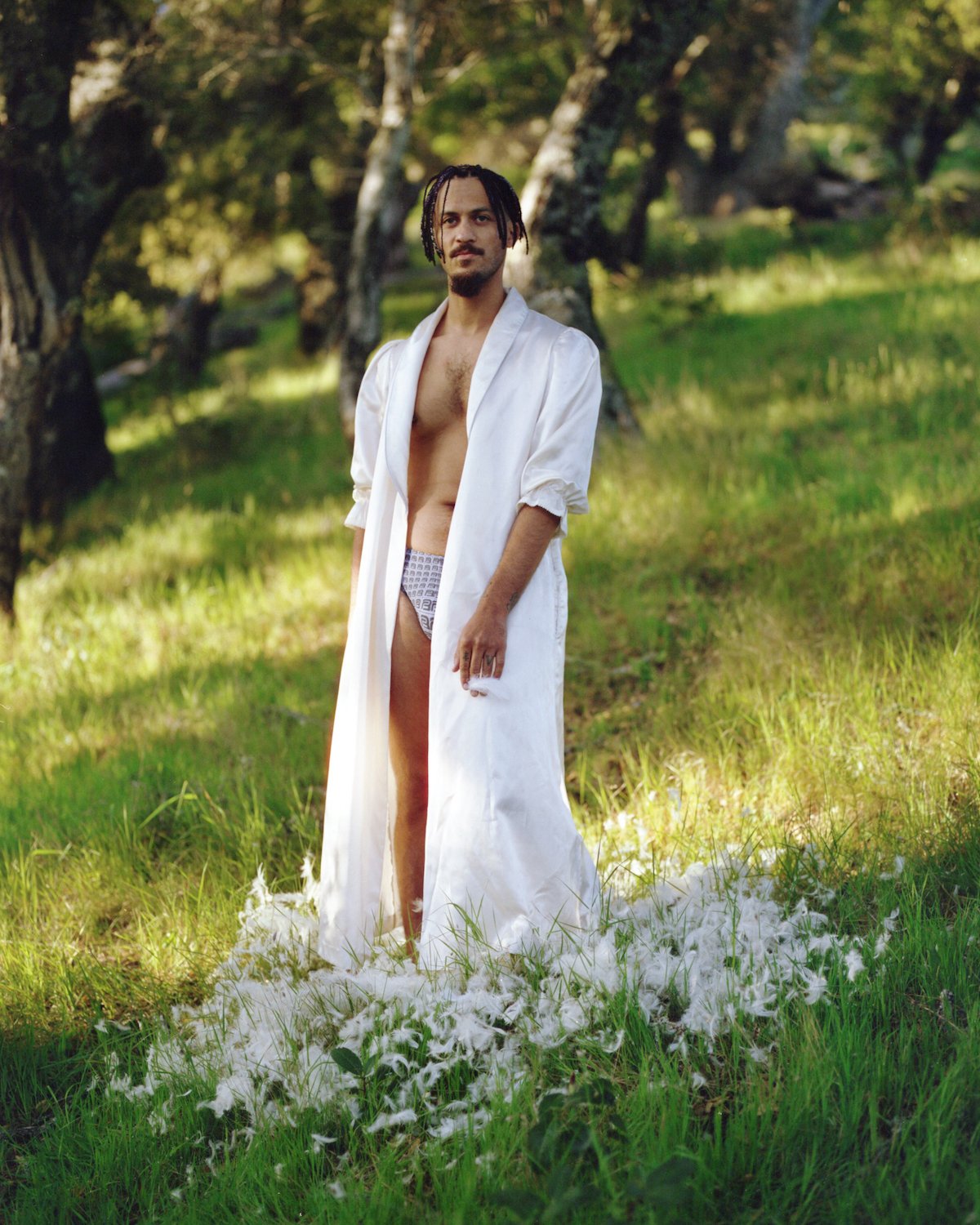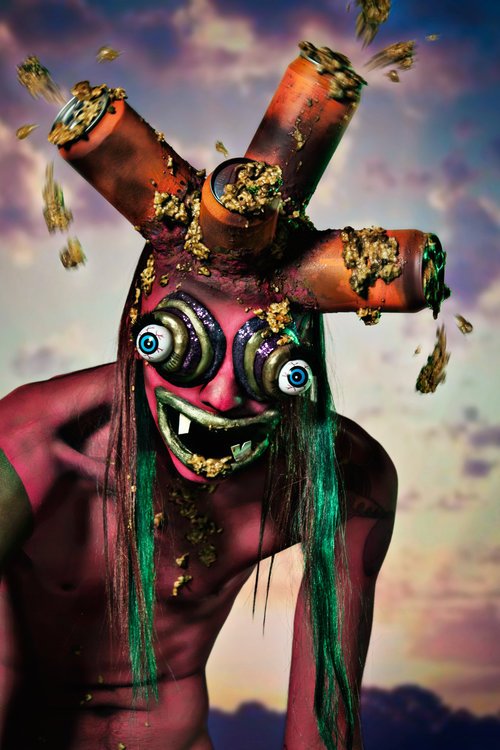Artist Profile: Tyler Holmes
Artist Profile: Tyler Holmes and Their Uncertain World
December 7, 2021
Adán Falcón
In an interview with Tyler Holmes, Adán Falcón speaks with the multifaceted artist about releasing and producing works in the pandemic, their musical influences and their view of the future to come. What becomes uncovered is a path of “going there,” to the edge and back, to an uncertain place with new music and perspectives.
Queering the Recognizable
“My mother asked recently, ‘Are you going to sing loud on this one?’ And I’m like, ‘Girl, I’m not going to yell on every song!’” It’s a fair question from her to Tyler Holmes, whose latest release, Nightmare in Paradise, mainly brings the listener along in a lower volume amongst synths, chamber music, and tales of love or trauma leaving the self in a state of tabula rasa. What is apparent, too, is a constant play between both control and the lack of it as the songs will suddenly change from a structured style into silences, with the synths only adding off-rhythms to gentle melodies, or a twisted volume to a song.
For the title track, Tyler knew they wanted a gospel song inspired by the Isley Brothers’ staple, “Shout”: “I want this to be my gospel church number. But I wanted to flip it; I didn’t want it to be standard, I wanted for it to have something that comes from my experience.” Their playing around from a high spiritual realm to their personal experience calls back to the beginning stage of the song that had more of an arcade sound (a version they hope to release soon with a video), hearkening back to their early days of making music with early recording software on earlier versions of Windows. This sound, blended with a recollection of a traumatic experience obscurely woven into the lyrics of the song about a bandmate and friend who nearly died, gestures towards a queering of what may be recognizable into something unknown. It’s a recurring theme in much of Tyler’s music for their music to shift around in something recognizable while oftentimes creating spaces filled with mystery and some humor.
In a Quieter World
Tyler and I spoke after they finished recording new material at Human Resources in Los Angeles, an art space that gave them an opportunity to record there with several bandmates from the LA area. The group they gathered (often referred to in our conversation as “the girls”) offered a perspective for them to help flesh out some of the ideas they had, now that they have the space to create since releasing Nightmare over six months ago. “All of the people that I worked with were amazingly just like lending such skill and craftsmanship and love to this project. And it felt like it was so sudden. I was like, ‘Hey everybody! Want to do this?!’”
Back in September, Tyler finally had a chance to try this group out in a live setting in front of an audience at the Rickshaw Stop, opening for Combo Chimbita. With several live performances coming and going with the state of the coronavirus, this circumstance, despite its difficulties, provides a space Tyler finds a lot of comfort in, but some unease as well: “We’re in the space right now with the pandemic where we keep doing these starts, stops, starts, stops where everyone really wants it to be over and wants things to go back to normal...And during the pandemic I’ve noticed this slowdown that was giving a lot of people a heart attack. I personally loved it, and have some agoraphobia, so having an excuse to not leave the house is terrific.”
Yet there’s a limit to this comfort, since having to be an artist in the pandemic requires having to navigate a terrain that is unprecedented in a business that relies so much on live settings for promotion.Tyler had to turn to alternative means outside of touring to promote their material, along with several other artists on their label Ratskin Records. For example, with Ratskin, they were able to put together their first release on vinyl with Nightmare in 2020 during the pandemic, but there was an initial drawback with the vinyl factory burning down to ground, forcing a six-month timeline for the records to be pressed to one year. Given its size as a record label, the promotion for Ratskin has been tireless on their end, with one of the founding members, Michael Dadonna, wearing multiple hats in emailing the press and going to different music shops for distribution. It’s been an experience for both Tyler and the record label to be learning together throughout this difficult time. On Tyler’s end, they trekked on with their promotion with a recent guest spot for NTS Radio for the show F U Pay Us Radio, livestream performances, or putting together new music videos not only for their music, but a recent cover of Sophie’s “BIPP”, which not only showcases the quieter synth approach Tyler has developed with Nightmare in Paradise, but also their experience trying on different personas for performances that has them showcasing different forms of masculinity in a tongue-in-cheek way.
An Otherworldly Being
Tyler had already been taking on very abstracted personas that fell in line with a lot of the more experimental side of drag in San Francisco, such as their experience with a group that included San Cha and Urheinous, painting their body in red make-up, or with their eyes bulging out with beer cans for a wig. As they have grown more in their music, the extremes in costumes have changed into more recognizable figures placed in unusual circumstances, such as their video for “Two Tylers”, from their EP, Devil, where a recognizable Tyler is seen with no visible costume, but placed in a setting that could be seen as a camp hiding a cult with dangerous motives. Where Tyler may have started with a more insular exploration of their work with intense transformations with make-up and melodrama, now with their resources and collaborations expanding, their transition has shifted their world-building to a more outward experience. They describe it as an attempt to “go there”, a place they not only encourage themself to go, but also the musicians they work with. It creates a portal to allow whoever is coming through the portal to come through, “...kind of like Poltergeist”: whatever is on the other side of these gestures or spaces, whether it be a spirit or monster, is something that is trying to communicate to the recipient. Whatever otherworldly being is trying to communicate may not be really clear, but for Tyler, it makes for a meaningful experience not only for their art but the art they love and admire in artists such as Tricky or Björk.
“With this new stuff that I’m working on now, my model is that I’m a Black Björk.” Beyond just the visual aesthetics of her works, Tyler is trying to expand their control over their compositions to those around them as Björk does with her compositions and collaborations, with their new material being written out more for percussionists, such as a marimbist and a vibraphone player, as well as the flute and much more. And like Björk or Tricky, they’re trying to mold an artistry in their music that isn’t limited specifically to electronic music as they’d previously done in the past; they’re providing more breadth in their work by finally showing what else they could potentially do. Despite its release this year, Nightmare’s gestation period started back in 2017 after a particularly traumatic period for Tyler, including the aforementioned near-death experience of their close friend and bandmate in Puerto Rico, which is documented in the album’s title song. In that span of time though, their work had developed from putting together pieces that have over 15 minutes of synth improvisation to works with more quiet and structured songwriting, With this new material Tyler is working on, they don’t feel a rush to release anything new right away as they explore this new space they’re creating while still promoting Nightmare.
“I’m here. I’m going to keep living…”
With our world attempting to open up while we go back and forth in Covid cases, it's often easy to see a morbid outlook of a future where there's a lot of uncertainty at play. Tyler carries on, though, with a stoic perspective in which the world is pulled in both a both a dark and bright outlook: “My work is about trauma, it’s about grief, it’s about processing all of these difficult things. It’s about death or almost dying. It’s about the things that are really life or death, so I think I live right on the edge.” Even with these experiences, they’re not coming out on the other side with answers for these major themes. “I’m never going to have the answers. I’m never going to know those things. That’s one of my personal beliefs and that if God or the universe or the creator wanted us to have the answers we would have them, and we don’t because I don’t think we’re supposed to know.”
Yet despite being on the edge, there is hope in the end for Tyler as they continue on with developing as an artist, continuing their communication with another realm that is speaking to them through being on the edge with their music and life: “...even though sometimes I’ll be like ‘I want to die, I don’t actually want to die. So, I think the resolve in my music is about that period: I’m here. I’m going to keep living, unless I decide to die or die by accident.”
Adán Falcón (he/him) is a grad school dropout, writer, and live music fanatic. Nowadays, you can find him running long distance with a playlist of krautrock and early 2000's hip hop, and rummaging record stores for limited edition vinyl.




